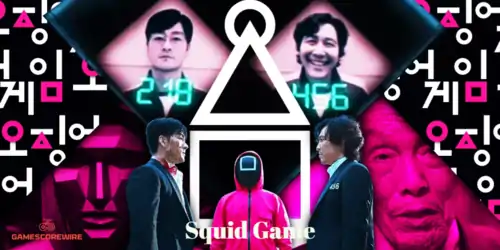
Table of Contents
Introduction
The climactic episode of Squid Game culminates in the sixth and final challenge: “Squid Game.” This brutal and symbolic showdown not only ties back to the show’s title but also serves as a microcosm of its overarching themes—desperation, survival, and the corruption of innocence. What begins as a childhood game ends as a life-or-death battle, highlighting the psychological and physical toll the competition has taken on its participants.
Overview of “Squid Game”
Basic Rules of the Game
The game is played on a ground diagram resembling a squid, divided into distinct sections such as the head, body, and tail. Players are split into two roles: offense and defense.
- Offense: The offensive player’s objective is to enter the squid’s diagram and advance to the head while staying within the boundaries. If they succeed, they win.
- Defense: The defensive player must prevent the offensive player from reaching the squid’s head by any means necessary.
Unlike previous games, “Squid Game” openly encourages violence, making it the most physically and emotionally grueling challenge of all. The final twist? Only one player survives, cementing the competition’s ruthless nature.
Purpose in the Show
“Squid Game” is both the literal end of the competition and a symbolic climax of the series. The game forces the final two players—Seong Gi-hun and Cho Sang-woo—to confront their shared history, their moral boundaries, and their deepest fears. It’s not just a fight for survival but a reckoning of their humanity.
Key Entities and Elements
The Squid Diagram
The iconic squid-shaped diagram drawn on the ground is both a nostalgic reference to a Korean childhood game and a battleground for the ultimate fight. Its shape, with distinct sections, adds layers of strategy and movement, making it more than just a physical contest. The diagram also serves as a symbolic representation of the players’ journey through the games, from the “tail” of their entry to the “head” of victory.
The Final Players
- Seong Gi-hun: The protagonist, who has survived the previous games with a mix of luck, resourcefulness, and moral struggle. Gi-hun enters the final game with a sense of duty, driven not only by survival but also by the haunting memories of the sacrifices made along the way.
- Cho Sang-woo: Gi-hun’s childhood friend, who has embraced ruthlessness and moral compromise to reach this stage. Sang-woo’s descent into calculated brutality contrasts sharply with Gi-hun’s lingering humanity, setting the stage for a deeply personal and ideological confrontation.
The Violence
Unlike earlier games that disguised violence within structured rules, “Squid Game” explicitly permits aggression. The physical combat between Gi-hun and Sang-woo is raw and unfiltered, reflecting the breakdown of decorum and the primal desperation for survival.
The Overseers and the VIPs
The game’s audience, including the masked VIPs and the Front Man, watches the brutal confrontation with detached amusement. Their voyeuristic pleasure highlights the exploitation and dehumanization of the players, adding another layer of critique to the show’s societal commentary.
Challenges and Symbolism in “Squid Game”
Moral and Emotional Toll
The final game is not just a physical contest but a moral crucible. For Gi-hun, the challenge lies in maintaining his humanity while fighting for his life. For Sang-woo, it’s a culmination of his pragmatic but morally bankrupt approach to survival. The clash between their philosophies amplifies the emotional weight of the game.
Symbol of Childhood Corrupted
“Squid Game” originated as a playful childhood activity, evoking memories of innocence and camaraderie. By turning it into a violent, high-stakes duel, the show underscores the loss of innocence and the transformation of simple joys into instruments of destruction under societal pressures.
Themes of Betrayal and Loyalty
The final game pits two childhood friends against each other, symbolizing the ultimate betrayal. Their shared history adds emotional complexity, making the violence not just physical but deeply personal.
Winner Takes All
The game’s winner claims the monetary prize, symbolizing the extreme individualism and zero-sum mentality perpetuated by the competition. The concept of “only one survives” reflects broader societal critiques, where success often comes at the expense of others.
The Climax: Gi-hun vs. Sang-woo
The final showdown between Gi-hun and Sang-woo is as much a battle of ideologies as it is a physical fight.
- Gi-hun’s Approach: He initially fights with desperation but hesitates when given the chance to deliver a killing blow. His refusal to abandon his humanity, even in the face of certain death, highlights his moral resilience.
- Sang-woo’s Fall: Sang-woo, in contrast, is willing to go to any lengths to win. However, his eventual suicide is a poignant moment, reflecting his recognition of the emptiness of victory at such a cost.
The emotional weight of Sang-woo’s decision and Gi-hun’s reaction underscores the complex humanity at the heart of Squid Game.
Impact on Viewers
The final episode delivers a heart-pounding climax that leaves a lasting impression. The brutality of “Squid Game,” juxtaposed with its symbolic and emotional depth, captivates viewers while challenging them to reflect on the broader societal issues the series critiques. The personal stakes, combined with the philosophical undertones, make this episode an unforgettable conclusion to the series.
Final Thoughts
The final game, “Squid Game,” encapsulates the essence of the series—a brutal exploration of survival, morality, and human nature. By turning a childhood game into a violent, high-stakes battle, the episode delivers a powerful commentary on societal inequality and the lengths to which people are driven by desperation. The clash between Gi-hun and Sang-woo is more than a fight; it’s a confrontation of ideals, leaving viewers questioning what it truly means to win.
Disclaimer: This article is for informational and entertainment purposes only. It discusses fictional content from the television series Squid Game. All rights to the series, characters, and related content belong to their respective creators and copyright holders.








